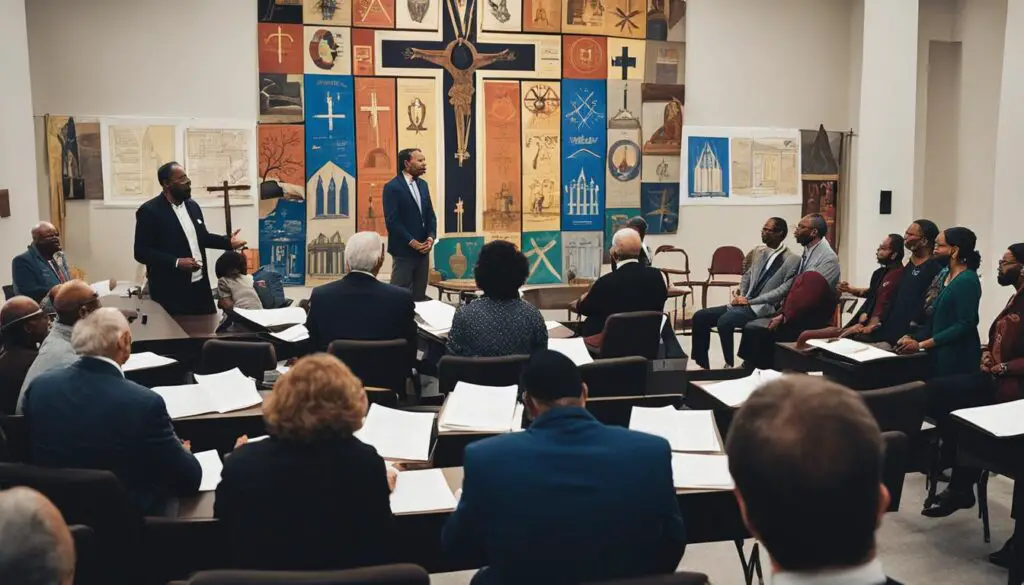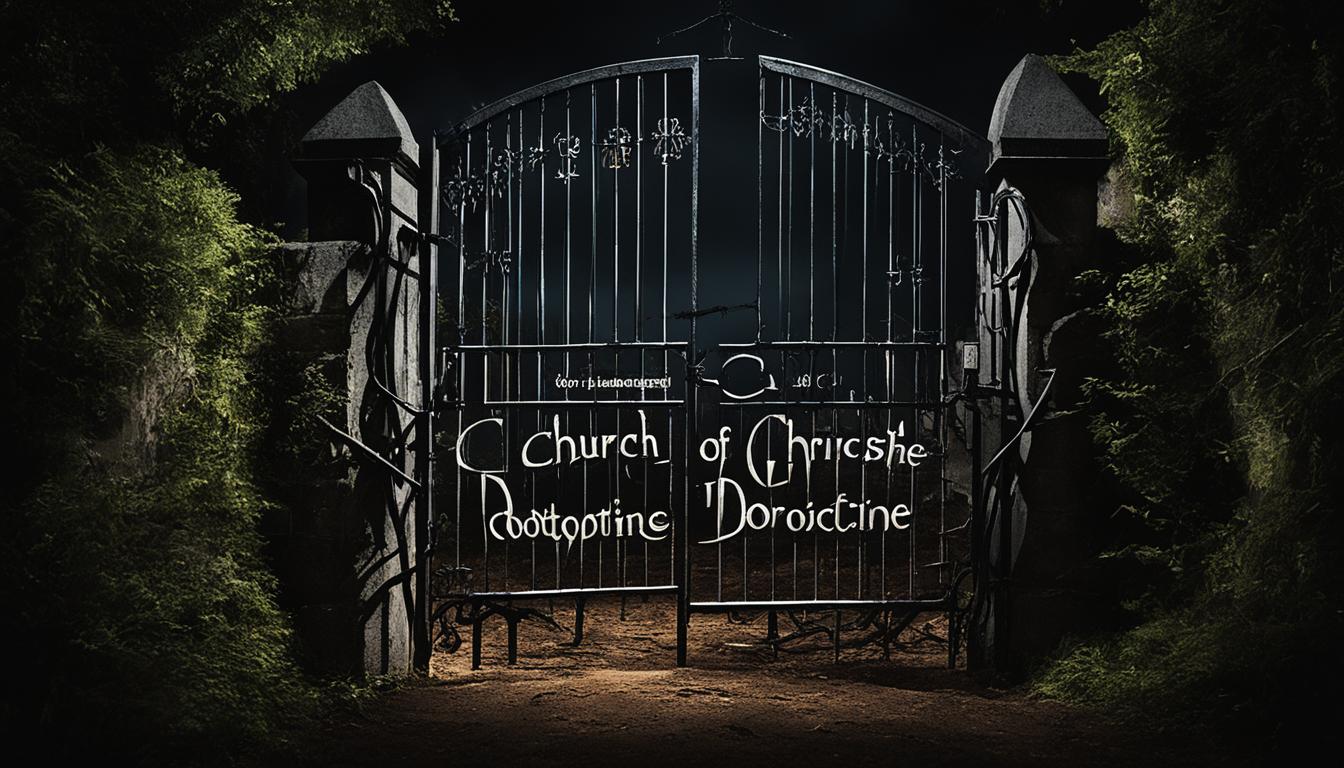The Church of Christ, known for its strict adherence to biblical teachings and practices, has faced its fair share of challenges and controversies regarding its doctrine. These issues have sparked debates, divisions, and criticisms within the Church, highlighting the complexity of navigating theological beliefs and practices.
One of the main problems with Church of Christ doctrine is the presence of controversial teachings that have generated conflicts and disputes. Different interpretations of scripture and understanding of church organization, work, and mission have led to doctrinal disagreements among members. These disagreements have not only caused division within the Church but have also resulted in the formation of separate groups such as the Christian Church and churches of Christ.
Criticisms against Church of Christ doctrine often revolve around the conservative nature of its beliefs and practices. Some argue that the Church’s strict interpretation of scripture may limit individual freedom and hinder cooperation with other Christian denominations. The Church of Christ has been labeled as exclusivist, and theological debates have arisen regarding its stance on salvation and the role of baptism in the process.
It is important to note that not all members of the Church of Christ hold the same beliefs, and there is variation within the denomination. The “antis,” a small percentage of conservative brethren, have been known for their strong opposition to certain practices and cooperation with other Christian groups.
Key Takeaways:
- The Church of Christ has faced challenges and controversies regarding its doctrine.
- Controversial teachings and differing interpretations have sparked division and disputes within the Church.
- Criticisms against Church of Christ doctrine revolve around its conservative nature and exclusivist tendencies.
- The “antis,” a minority group within the Church, strongly oppose certain practices and cooperation with other Christian groups.
- Navigating theological beliefs and practices within the Church of Christ requires open dialogue and critical examination.
The Restoration Movement and Church Divisions
The 19th-century Restoration Movement played a pivotal role in the quest to restore apostolic Christianity and revive the original form of the church. This movement involved prominent figures such as Barton W. Stone and Thomas and Alexander Campbell, who shared a common goal of restoring the entire Christian church based on the doctrine outlined in the New Testament.
The Restoration Movement firmly believed that through this restoration, unity among Christians could be achieved. The movement aimed to bridge the gaps created by church divisions and bring all followers of Christ together in harmony.
However, over time, even the Restoration Movement itself experienced divisions, leading to the emergence of different groups within the movement. These divisions resulted in the formation of separate entities such as the Church of Christ, Christian Church, and Disciples of Christ.
Despite these divisions, members of the Church of Christ consider themselves to be a continuation of the church originally established on Pentecost in A.D. 30. While influenced by the Restoration Movement, they emphasize their direct connection to the early apostolic Christianity, preserving the core teachings and practices.
To illustrate the complexities of church divisions within the Restoration Movement, a table is presented below:
| Group | Key Figures | Key Beliefs |
|---|---|---|
| Church of Christ | Barton W. Stone | Restoration of New Testament Christianity |
| Christian Church | Thomas and Alexander Campbell | Unity among Christians on biblical principles |
| Disciples of Christ | Thomas and Alexander Campbell | Rejection of creeds, emphasis on personal faith |

Despite the divisions within the Restoration Movement, its importance lies in the impact it had on shaping the beliefs and practices of these distinct groups, guiding their understanding of apostolic Christianity.
In the next section, we delve into the abuses and controversies that have arisen within the church, shedding light on the challenges faced in maintaining the integrity of the faith.
Abuses and Controversies within the Church
Within the church environment, certain abuses and controversies have emerged, threatening the well-being of individuals and the integrity of the institution itself. These issues, which range from spiritual abuse to the promotion of a damaging purity culture, require careful examination and open dialogue for resolution.
Spiritual Abuse
One significant form of abuse within the church is spiritual abuse. This occurs when individuals in positions of religious authority misuse their power and manipulate others through coercion, manipulation, shaming, and exploitation. People who experience spiritual abuse may suffer from psychological and emotional trauma, hindering their spiritual growth and well-being.
Forced Forgiveness
Another concerning issue is forced forgiveness, where individuals are pressured to forgive without genuine repentance or change from the offender. While forgiveness is an essential aspect of many religious beliefs, it should not be enforced or used as a means to silence victims or perpetuate harm. True forgiveness requires sincere remorse and a commitment to change.
Mental Illness Abuse
The denial or minimization of mental illness within religious communities is also a significant concern. Mental illness abuse involves attributing mental health struggles solely to spiritual issues, discouraging individuals from seeking professional help. This can exacerbate mental health conditions, increasing the burden on those already suffering and preventing access to necessary support and treatment.
Misuse of Spiritual Authority
Misuse of spiritual authority is another form of abuse that can occur within the church. Individuals may claim false spiritual authority, using it to manipulate and suppress differing opinions and voices. This abuse of power stifles healthy dialogue and prevents the growth and development of a diverse and inclusive community.
Purity Culture
Purity culture, a subculture that emphasizes sexual abstinence until marriage, has also been a source of harm within the church. While promoting abstinence and sexual purity can be positive, the extreme and fear-based approach of purity culture has led to feelings of guilt, shame, and control. This culture creates unrealistic expectations and can damage individuals’ self-worth and relationships.
| Abuse/Controversy | Description |
|---|---|
| Spiritual Abuse | Occurs when individuals misuse their authority and manipulate others through coercion, manipulation, shaming, and exploitation. |
| Forced Forgiveness | Pressuring individuals to forgive without genuine repentance or change from the offender. |
| Mental Illness Abuse | Denying or minimalizing the existence of mental illness or attributing it to spiritual issues instead of seeking professional help. |
| Misuse of Spiritual Authority | Claiming false spiritual authority and using it to suppress differing opinions. |
| Purity Culture | A subculture that emphasizes abstinence until marriage and often uses fear, guilt, and shame to control behavior. |
These abuses and controversies undermine the credibility of the church and its message, driving individuals away and hindering their spiritual growth. It is crucial for religious communities to address these issues, foster safe environments, and promote the values of compassion, understanding, and inclusivity.

Conclusion
The Church of Christ has grappled with various challenges and controversies surrounding its doctrine. The presence of divisions within the church over doctrinal matters reflects a longstanding issue that has caused splits and the formation of separate groups in the past.
The Restoration Movement, a significant effort to restore the original form of the church and promote unity among Christians, has also experienced further divisions within its own ranks, resulting in the emergence of different groups like the Church of Christ, Christian Church, and Disciples of Christ.
Moreover, the church has faced abuses and controversies from within, such as spiritual abuse, forced forgiveness, mental illness abuse, misuse of spiritual authority, and the negative impacts of purity culture. These issues have cast a shadow on the credibility of the church and its message.
In light of these challenges, it is crucial for the Church of Christ to engage in critical examination and open dialogue to address and resolve the various issues that have arisen. By fostering honest conversation and seeking mutually respectful solutions, the church can navigate these difficulties and strive for a more harmonious and authentic expression of its beliefs and teachings.
FAQ
Are there any problems with Church of Christ doctrine?
Yes, there have been controversies and challenges surrounding the doctrine of the Church of Christ. Divisions within the church over doctrinal issues have been a significant issue, with disagreements over the organization, work, and mission of the church.
What are some controversial teachings of the Church of Christ?
One controversial teaching of the Church of Christ is the belief in baptismal regeneration, which asserts that baptism is necessary for salvation. This teaching is debated among Christian denominations. Additionally, the strict interpretation of the “silence of the scriptures” has led to controversies regarding the use of instruments in worship and women’s roles in the church.
Are there any challenges with Church of Christ beliefs?
Yes, there are challenges with Church of Christ beliefs. The division within the church over doctrinal issues has caused conflicts and disputes. These challenges have resulted in the formation of separate groups such as the Christian Church and churches of Christ.
What are some criticisms against Church of Christ doctrine?
Criticisms against Church of Christ doctrine include the belief in baptismal regeneration, the strict interpretation of the “silence of the scriptures,” and the exclusion of instrumental music in worship. Some also criticize the Church of Christ for its exclusivist view that they are the only true church.
What theological debates occur within the Church of Christ?
Theological debates within the Church of Christ revolve around various issues, including baptismal regeneration, the use of instruments in worship, women’s roles in the church, and the concept of grace. These debates reflect the diversity of beliefs within the church community.
What are some concerns about Church of Christ doctrine?
Concerns about Church of Christ doctrine include the exclusivist view that they are the only true church. This belief can create tensions with other Christian denominations and hinder efforts for ecumenism and unity.
Are there any misconceptions about the Church of Christ?
Yes, there are misconceptions about the Church of Christ. Some people mistakenly believe that all Church of Christ congregations share the same beliefs and practices, when in reality, there can be variations in interpretation and traditions within the church.
How did the Restoration Movement impact church divisions?
The Restoration Movement in the 19th century aimed to return to apostolic Christianity and restore the original form of the church. However, this movement itself experienced divisions, resulting in the formation of different groups such as the Church of Christ, Christian Church, and Disciples of Christ.
What are some abuses and controversies within the Church of Christ?
Abuses and controversies within the Church of Christ include spiritual abuse, forced forgiveness, mental illness abuse, misuse of spiritual authority, and the negative effects of purity culture. These issues have undermined the credibility of the church and its message.
How has the Church of Christ addressed these challenges?
The Church of Christ is a diverse community, and different congregations may address these challenges in their own ways. However, there is a growing recognition within the church of the need for critical examination, open dialogue, and a willingness to address and resolve these challenges.

